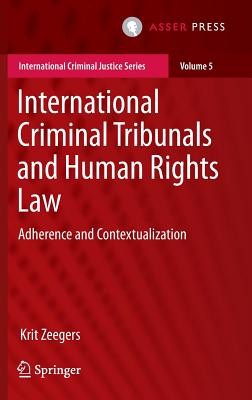
- We will send in 10–14 business days.
- Author: Krit Zeegers
- Publisher: T.M.C. Asser Press
- Year: 2016
- Pages: 434
- ISBN-10: 9462651019
- ISBN-13: 9789462651012
- Format: 15.6 x 23.4 x 2.5 cm, hardcover
- Language: English
- SAVE -10% with code: EXTRA
International Criminal Tribunals and Human Rights Law (e-book) (used book) | bookbook.eu
Reviews
Description
This book addresses the interpretation and application of human rights norms by International Criminal Tribunals (ICTs). Such Tribunals are widely heralded as human rights defenders. At the same time, however, they employ activities that necessary entail the risk of human rights violations: they conduct criminal investigations, arrest and detain individuals, and put them on trial. This book investigates this flip-side of the ICTs' relationship with international human rights law, and focuses on the ICTs' own interpretation and application of human rights norms.
First, the book addresses whether and how ICTs are bound by human rights law, since unlike states, they do not sign or ratify human rights conventions. Second, the book provides an in-depth analysis of the way in which ICTs interpret and apply human rights norms, compared to the way in which these norms are interpreted in a traditional state-context. Relying on the unique circumstances in which they operate, ICTs have often deviated from generally accepted interpretations of human rights. The author critically examines this so-called contextual approach and seeks to recommend ways in which ICTs can improve their interpretative practice by giving due regard to the context in which they operate, while still providing adequate human rights protection.
Addressing the ICTs' possible leeway in terms of contextualization, this book contributes to the broader debates about adherence to human rights norms in international law.
Krit Zeegers is an Associate at Allen & Overy LLP, Amsterdam, and previously worked as a researcher / junior lecturer at the University of Amsterdam.
EXTRA 10 % discount with code: EXTRA
The promotion ends in 20d.08:10:28
The discount code is valid when purchasing from 10 €. Discounts do not stack.
- Author: Krit Zeegers
- Publisher: T.M.C. Asser Press
- Year: 2016
- Pages: 434
- ISBN-10: 9462651019
- ISBN-13: 9789462651012
- Format: 15.6 x 23.4 x 2.5 cm, hardcover
- Language: English English
This book addresses the interpretation and application of human rights norms by International Criminal Tribunals (ICTs). Such Tribunals are widely heralded as human rights defenders. At the same time, however, they employ activities that necessary entail the risk of human rights violations: they conduct criminal investigations, arrest and detain individuals, and put them on trial. This book investigates this flip-side of the ICTs' relationship with international human rights law, and focuses on the ICTs' own interpretation and application of human rights norms.
First, the book addresses whether and how ICTs are bound by human rights law, since unlike states, they do not sign or ratify human rights conventions. Second, the book provides an in-depth analysis of the way in which ICTs interpret and apply human rights norms, compared to the way in which these norms are interpreted in a traditional state-context. Relying on the unique circumstances in which they operate, ICTs have often deviated from generally accepted interpretations of human rights. The author critically examines this so-called contextual approach and seeks to recommend ways in which ICTs can improve their interpretative practice by giving due regard to the context in which they operate, while still providing adequate human rights protection.
Addressing the ICTs' possible leeway in terms of contextualization, this book contributes to the broader debates about adherence to human rights norms in international law.
Krit Zeegers is an Associate at Allen & Overy LLP, Amsterdam, and previously worked as a researcher / junior lecturer at the University of Amsterdam.


Reviews